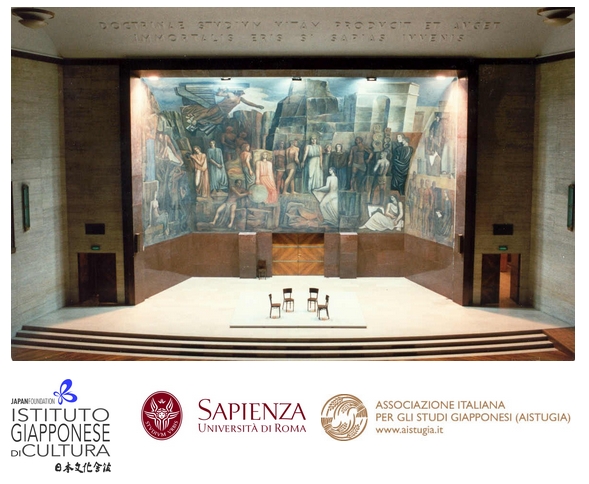Dalle radici ai rami fioriti della letteratura giapponese, nelle parole di chi l’ha studiata, tradotta e trasmessa al pubblico italiano e straniero. Alla presenza delle Loro Altezze Imperiali il Principe e la Principessa Akishino, si aprono i lavori del simposio internazionale in due giornate, il 12 maggio presso il Palazzo del Rettorato alla Sapienza Università di Roma – ospite d’eccezione lo scrittore Abe Kazushige – e il 13 maggio presso l’Istituto Giapponese di Cultura in Roma.
Per addetti ai lavori, per tutti.
Per partecipare all’evento del 12/05 è necessario compilare il form di cui al link sottostante:
http://goo.gl/forms/651w2ppHEc

International Symposium
From the roots to the flowering branches of Japanese literature
May 12th
Sapienza University of Rome
10.30-12.00
“Aula Magna”
Welcome addresses
Naomi Takasu, Director of the Japan Cultural Institute in Rome
Matilde Mastrangelo, Director of the ISO Department of Sapienza University of Rome
Video message from Donald Keene, Professor emeritus at Columbia University
Keynote dialogue between Kazushige Abe and Gianluca Coci, moderated by Matilde Mastrangelo
Seeds, Roots, Pistils: Contemporary Japanese Literature’s Flower Power
Greetings from His Imperial Highness Prince Akishino
and Eugenio Gaudio, President of Sapienza University of Rome
15.00-16.30
“Aula degli Organi Collegiali” in connection with “Aula Telematica”
First Session
Chair: Ikuko Sagiyama, University of Florence
Gitte Marianne Hansen, Newcastle University
Women in the world of Murakami Haruki
Thomas Garcin, Strasbourg University
Inventing Japanese-ness – Re-examining Yukio Mishima’s Yūkoku
Matilde Mastrangelo
Talking about historical novels, the different approaches of Mori Ōgai and Yukio Mishima
May 13th
The Japan Cultural Institute in Rome
10.00-12.00
Second Session
Chair: Matilde Mastrangelo
Gala Maria Follaco, “L’Orientale” University of Naples
The city as literary practice: Nagai Kafū’s meisho, old and new
Luca Milasi, Sapienza University of Rome
Kōda Rohan and the Modernity of Tradition: classic themes for a new forma mentis
Katarzyna Sonnenberg, Jagiellonian University
Searching for an Objective Correlative in Prose. A Reading of Natsume Sōseki’s Ichiya and Akutagawa Ryūnosuke’s Hankachi
Stefano Romagnoli, Sapienza University of Rome
Flowers of China: The genderization of war in Hino Ashihei’s Hana to heitai
14.00-16.00
Third Session
Chair: Ikuko Sagiyama
Maria Chiara Migliore, University of Salento
China as a Mirror: The Tokyū no fu of Prince Kaneakira (914-987)
Edoardo Gerlini, University of Florence
To who belongs Japanese Literature? – some open questions suggested by the reception of Sugawara no Michizane
Rumi Tani Moratalla, Autonomous University of Madrid
The issue of lyric transference to Spanish: the case of Man’yōshū
Martha-Christine Menzel, Heidelberg University
Longing for an Independent Local Identity: The Case of Hokkaidō Literature
*The working language of the symposium will be English, except the program for 12th AM which will be Italian.
*La lingua dei lavori del simposio sarà l’inglese, ad eccezione della mattina del 12 maggio in cui la lingua utilizzata sarà l’italiano.
Kazushige Abe
Kazushige Abe is that rare type of talent that has succeeded not only in making an impact on his readers, but also the creators and authors of his own generation. Ever since his debut in 1994 with Day for Night, for which he promptly received the Gunzo Literary New Face Award, Abe has continued to produce award- winning works time and time again. His spy novel Individual Projection even gave birth to the new genre of “Shibuya literature,” causing a sensation in Japanese literary circles. After this great success, Abe went on to win the Noma Literary New Face Award for You Can’t Always Get What You Want, and the 15th Sei Ito Literary Award and the 58th Mainichi Culture Award for Sinsemillas, an epic work featuring over 50 characters. His 2005 novel Grand Finale appropriately enough received one of the most prestigious literary awards in Japan, the Akutagawa Prize, and was followed in 2010 by Pistils, which in turn won the Junichiro Tanizaki Prize.
Translated Works (Selected)
- Il proiezionista (trad. Gianluca Coci), Calabuig, Milano 2015
- Ride on Time (trad. Gianluca Coci), in Gianluca Coci (a cura di), Scrivere per Fukushima – Racconti e saggi a sostegno dei sopravvissuti del terremoto, Atmosphere libri, Roma 2013, pp. 7-12
- Sinsemillas, Editions Philippe Picquier, France 2013
